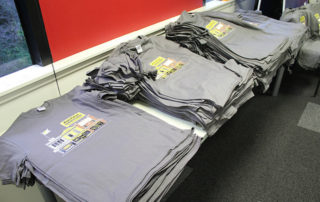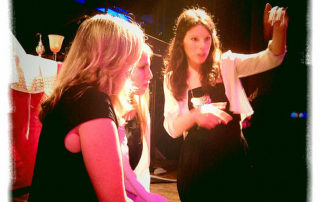Joining at a distance: Five things missing when people start new jobs remotely
We’re nearly a year into the pandemic and, for many of us, life goes on. I'm working with companies who are recruiting and coaching a couple of people who’ve started new leadership positions during lockdown. But starting a new job is different now. This month I want to focus what's missing when people start new jobs in a pandemic. So here are five things you don’t get in a remote working environment - and some of them have an upside. 1. Physical presence Like it or not, we make judgments about people, often unconsciously, based on their physical presence – ...
Myth #1: Technical specialists make lousy managers
This is the first in a series on workplace myths, many of which are based on stereotypes - soft female leaders, socially awkward geeks, psychologists obsessed with feelings. Like most stereotypes, there's generally a grain of truth in them. There's a reason we talk about German efficiency and Italian style, not the other way round. But stereotypes don't apply in every case, as I discovered when using the Bavarian rail network this summer (couldn't even manage a queue for a replacement bus service). It's the same with workplace myths - something which has some value as a generality can be ...
VUCA: What can the American military teach us about business?
Don’t worry, this isn’t another one of those articles suggesting that you need the camaraderie and grit of the marines as you lead your team through another gruelling week servicing the nation’s photocopiers or whatever it is you do for a living. This military lesson isn’t really about people at all. It’s about a way of thinking about situations. Developed by the US military, it’s called VUCA, which stands for: • Volatility • Uncertainty • Complexity • Ambiguity It’s easy to see how this would be useful to military strategists looking at complex, confusing and unstable situations such as in ...
Looking for the potential in people – Should your career have breadth or depth?
Many organisations spend a lot of time and money identifying and developing ‘high potential’ employees. This is understandable – at least some of them are likely to be future leaders of the business. But what about everyone else? Don’t they deserve the chance to fulfil their potential too? Maybe it’s time we stopped looking for ‘people with potential’ and started looking for the potential in people. Everyone has potential I believe everyone has potential; we just don’t all have the same potential. Clearly some people are likely to go further than others and it’s not just a question of ambition. ...
Been there, done that, got the t-shirt. How much experience do you need to dabble in someone else’s job?
How much do you need to know about someone else’s job to have a say in it? Do you have to have done the job yourself to know whether they’re doing it properly? Common sense would suggest not – you don’t have to be a trained chef to recognise a badly cooked meal, for example. Yet a lot of people, particularly highly technical people, like engineers or IT professionals, seem to take umbrage at anyone who doesn’t share their expertise having any involvement in their jobs at all. In this blog I’m exploring how much you need to know to ...
Experience or brains – Which matters more in a senior role?
Which matters more when you're hiring someone for a senior job - intelligence or experience? You may be thinking, 'it's obvious, go for the experience'. On the other hand, you may be thinking, 'it's obvious, go for the brains'. Which one you favour tends to reflect your own biases rather than any universal truth. Ideally, of course, you'd want both, but let's say that's not on offer. Imagine you're recruiting a Senior Operations Manager in a manufacturing company. In your business, raw materials come in, you turn them into something else and store those products, before shipping them out. This ...
Unravelling the mysteries of in-depth psychological profiling
As a business psychologist, one of my main activities is in-depth psychological profiling of people. It’s not the only thing I do but it’s certainly a big part of my job. What I’ve realised when I talk to people, however, is that they don’t really understand what I mean by it. So this month I thought I’d go back to basics and explain just what psychologists do when we profile someone. And now I've muddied the waters again with a picture of a couch. Sadly, there's no couch. What’s it for? The aim of assessing someone in this way is ...
Too much of a good thing – The hidden dangers of being too modest
No one likes a show off, right? We can all think of people who constantly bang on about how brilliant they are and what they’ve achieved this month. People who make sure you know what their house is worth or tell you the detailed spec of their high end car and so on and so on. It grates and, frankly, it’s not very British. So it’s better to be modest, obviously. Well mostly. I want to highlight the hidden dangers of being too modest. Now you’re probably thinking that I mean the risk of being overlooked. Modest people don’t sell ...
Did psychologists bring down a bank?
If you’ve read the business pages of the papers recently, you might begin to believe that people like me, with our dangerous voodoo magic, at least indirectly caused the demise of the Co-op Bank. It follows revelations at a Treasury select committee hearing that – shockingly, it would seem – some (unspecified) form of psychometric testing was used in the appointment of the now-disgraced Co-op chairman, Paul Flowers. The press have had a field day with this, giving the impression that the selection panel were so taken with the test results that they forgot to check whether he could run ...
Mince pies, mischief and malice – The dark side of the office Christmas party
In last month’s blog, I discussed the ‘shadow side’ of personality, i.e. those bits of ourselves which we normally keep hidden but which emerge when we’re too stressed, tired or drunk to keep up a polite façade any longer. I described three broad trends – under pressure some of us move towards others, some move away from others and some move against others. This month I thought I’d explore the individual characteristics within those broad categories. In this festive season, what better way to do that than to see how they play out at the office Christmas party of a ...
Joining at a distance: Five things missing when people start new jobs remotely
We’re nearly a year into the pandemic and, for many of us, life goes on. I'm working with companies who are recruiting and coaching a couple of people who’ve started new leadership positions during lockdown. But starting a new job is different now. This month I want to focus what's missing when people start new jobs in a pandemic. So here are five things you don’t get in a remote working environment - and some of them have an upside. 1. Physical presence Like it or not, we make judgments about people, often unconsciously, based on their physical presence – ...
Myth #1: Technical specialists make lousy managers
This is the first in a series on workplace myths, many of which are based on stereotypes - soft female leaders, socially awkward geeks, psychologists obsessed with feelings. Like most stereotypes, there's generally a grain of truth in them. There's a reason we talk about German efficiency and Italian style, not the other way round. But stereotypes don't apply in every case, as I discovered when using the Bavarian rail network this summer (couldn't even manage a queue for a replacement bus service). It's the same with workplace myths - something which has some value as a generality can be ...
VUCA: What can the American military teach us about business?
Don’t worry, this isn’t another one of those articles suggesting that you need the camaraderie and grit of the marines as you lead your team through another gruelling week servicing the nation’s photocopiers or whatever it is you do for a living. This military lesson isn’t really about people at all. It’s about a way of thinking about situations. Developed by the US military, it’s called VUCA, which stands for: • Volatility • Uncertainty • Complexity • Ambiguity It’s easy to see how this would be useful to military strategists looking at complex, confusing and unstable situations such as in ...
Looking for the potential in people – Should your career have breadth or depth?
Many organisations spend a lot of time and money identifying and developing ‘high potential’ employees. This is understandable – at least some of them are likely to be future leaders of the business. But what about everyone else? Don’t they deserve the chance to fulfil their potential too? Maybe it’s time we stopped looking for ‘people with potential’ and started looking for the potential in people. Everyone has potential I believe everyone has potential; we just don’t all have the same potential. Clearly some people are likely to go further than others and it’s not just a question of ambition. ...
Been there, done that, got the t-shirt. How much experience do you need to dabble in someone else’s job?
How much do you need to know about someone else’s job to have a say in it? Do you have to have done the job yourself to know whether they’re doing it properly? Common sense would suggest not – you don’t have to be a trained chef to recognise a badly cooked meal, for example. Yet a lot of people, particularly highly technical people, like engineers or IT professionals, seem to take umbrage at anyone who doesn’t share their expertise having any involvement in their jobs at all. In this blog I’m exploring how much you need to know to ...
Experience or brains – Which matters more in a senior role?
Which matters more when you're hiring someone for a senior job - intelligence or experience? You may be thinking, 'it's obvious, go for the experience'. On the other hand, you may be thinking, 'it's obvious, go for the brains'. Which one you favour tends to reflect your own biases rather than any universal truth. Ideally, of course, you'd want both, but let's say that's not on offer. Imagine you're recruiting a Senior Operations Manager in a manufacturing company. In your business, raw materials come in, you turn them into something else and store those products, before shipping them out. This ...
Unravelling the mysteries of in-depth psychological profiling
As a business psychologist, one of my main activities is in-depth psychological profiling of people. It’s not the only thing I do but it’s certainly a big part of my job. What I’ve realised when I talk to people, however, is that they don’t really understand what I mean by it. So this month I thought I’d go back to basics and explain just what psychologists do when we profile someone. And now I've muddied the waters again with a picture of a couch. Sadly, there's no couch. What’s it for? The aim of assessing someone in this way is ...
Too much of a good thing – The hidden dangers of being too modest
No one likes a show off, right? We can all think of people who constantly bang on about how brilliant they are and what they’ve achieved this month. People who make sure you know what their house is worth or tell you the detailed spec of their high end car and so on and so on. It grates and, frankly, it’s not very British. So it’s better to be modest, obviously. Well mostly. I want to highlight the hidden dangers of being too modest. Now you’re probably thinking that I mean the risk of being overlooked. Modest people don’t sell ...
Did psychologists bring down a bank?
If you’ve read the business pages of the papers recently, you might begin to believe that people like me, with our dangerous voodoo magic, at least indirectly caused the demise of the Co-op Bank. It follows revelations at a Treasury select committee hearing that – shockingly, it would seem – some (unspecified) form of psychometric testing was used in the appointment of the now-disgraced Co-op chairman, Paul Flowers. The press have had a field day with this, giving the impression that the selection panel were so taken with the test results that they forgot to check whether he could run ...
Mince pies, mischief and malice – The dark side of the office Christmas party
In last month’s blog, I discussed the ‘shadow side’ of personality, i.e. those bits of ourselves which we normally keep hidden but which emerge when we’re too stressed, tired or drunk to keep up a polite façade any longer. I described three broad trends – under pressure some of us move towards others, some move away from others and some move against others. This month I thought I’d explore the individual characteristics within those broad categories. In this festive season, what better way to do that than to see how they play out at the office Christmas party of a ...









